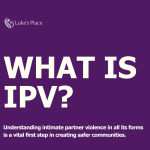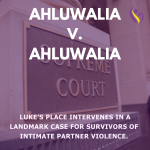Legal news & strategy
Join our team! Volunteer Director, Board of Directors
About Luke’s Place: Luke’s Place Support & Resource Centre for Women & Children is an award-winning non-profit centre of excellence in family law support for women who have been subjected to intimate partner abuse. We are devoted to improving the safety and experience of women and their children as they proceed through the complex family…
Read moreFor immediate release: National Gender-Based Violence Legal Programs Face Funding Expiry, Advocates Call for Government Action
September 17, 2025 – For Immediate Release What: Federal funding for gender-based violence legal programs, trauma-informed legal support for survivors of sexual and intimate partner violence, that support the 50% of women and gender diverse people in Canada who experience gender-based violence survivors a year is set to end imminently, with no opportunity for renewal. …
Read moreInquests and Justice: Renfrew County and Beyond with Pamela Cross
What is an inquest, and why does it matter in the fight against gender-based violence? In a powerful new episode of the RAGE podcast, lawyer, author, and long-time advocate Pamela Cross joins the hosts to unpack these questions. The conversation takes a close look at the Renfrew County Inquest, which examined the 2015 murders of…
Read moreWhat is Intimate Partner Violence (IPV)
At Luke’s Place, we provide support to women who have been subjected to intimate partner violence (IPV). Their stories are powerful reminders that abuse is not always visible and that understanding what IPV really looks like is essential to offering meaningful support. IPV does not always look like bruises or broken bones. Sometimes, it is…
Read moreThe Hub Interview: Pamela Cross on why intimate partner violence is a Canadian problem
As we approach the Donner Prize ceremony on Thursday, May 15, we are proud to celebrate Pamela Cross, lawyer, advocate, and tireless leader in the fight against gender-based violence. Pamela has been shortlisted for the prestigious award for her powerful book, And Sometimes They Kill You: Confronting the Epidemic of Intimate Partner Violence, which sheds…
Read moreLuke’s Place will be intervening at the Supreme Court of Canada in the case of Ahluwalia v. Ahluwalia
On February 11th and 12th, 2025 Luke’s Place will appear before the Supreme Court of Canada in Ahluwalia v. Ahluwalia – a landmark case that will determine whether there should be a tort of family violence. This is a historic moment. Survivors of family violence often face significant legal barriers, and this case could change the landscape of legal…
Read moreCriminalization of coercive control: shifting the focus to system change before implementation
Last week, Luke’s Place submitted a Brief to the Standing Senate Committee on Legal and Constitutional Affairs on Bill C-332, An Act to amend the Criminal Code (coercive control of intimate partner). This Brief reflects our decades of experience supporting survivors of intimate partner violence (IPV) and navigating the intersections of the family law and…
Read moreMandatory Reporting is Not a Prevention Strategy
A senate public Bill, Bill S-249, has passed its first two readings and is now with the Senate Committee on Social Affairs, Science and Technology for consideration. This Bill calls for the creation of a national strategy to address intimate partner violence (IPV). Included in this Bill is a provision that proposes that this national…
Read moreAn update on criminalizing coercive control
At Luke’s Place, we support women and their children who have left abuse and are engaged with the family law/court process through both direct service and system change work. Through this work, we have developed a deep understanding of the many ways different legal systems intersect with and affect women’s family law experiences. We have…
Read moreParental alienation, family violence and family law: Part two
In her 2023 report entitled, “Custody, violence against women and violence against children”, U.N. Special Rapporteur on Violence Against Women and Girls, Reem Aslalem, describes parental alienation as a “discredited and unscientific pseudo-concept” that serves as a tool for abusers “to continue their abuse and coercion and to undermine and discredit allegations of domestic violence…
Read more






